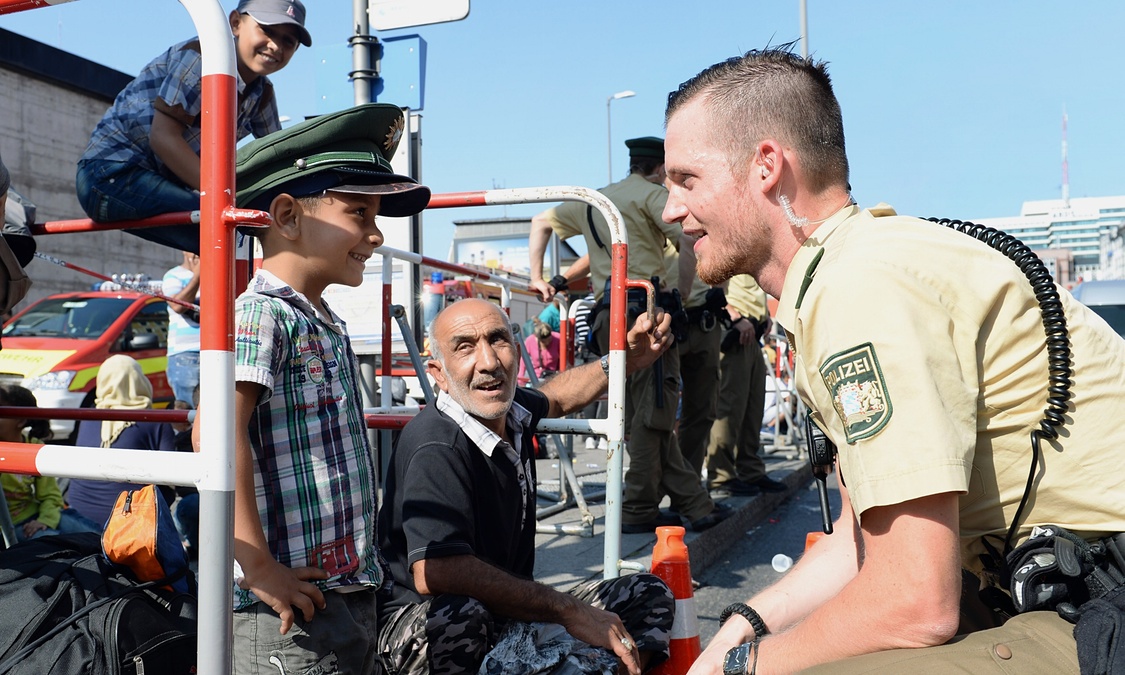At the dinner table at home in Germany, we often discuss the plight my cousin in Syria faces. We talk about how my dad eventually convinced him not to hire a trafficker to sneak him out of his war-torn homeland and into neighbouring Turkey. We try to figure out a way to get my cousin out without having him risk his life along the way.
The injustice of the migration system that criminalizes people’s attempts to seek refuge makes me sick. But this is not the only thing wrong with the recent European debate on the refugee crisis.
It is surprising how the European and international media and political elites are celebrating German Chancellor Angela Merkel for her “humanitarian turn” in the refugee crisis, putting her on a pedestal as Europe’s conscience on the refugee crisis. The fact of the matter is that the recent change in Merkel’s migration and asylum policy isn’t half as progressive or humanitarian as commentators and enthusiasts are painting it.
In fact, it is a selective opening driven by economic considerations and a demographic pressure for immigration at least as much as by concerns about the situation of refugees.
While some already discuss the challenge of ensuring Merkel and her fellow Germans’ long-term commitment to the challenge of integration, the real crime is the institutionalized criminalization of migration that makes it impossible for most refugees to seek their right to refuge in a legal way.
Due to this criminalization, the only option for the vast majority of refugees is to make their way to a safe country illegally. This is what is fuelling the trafficking economy and a few rescue ships in the Mediterranean will not solve that problem.
What really needs to be done is making asylum applications accessible for people in need and improving their living conditions in the camps throughout war-torn hotspots.
In central Europe, however, Berlin continues to deport asylum seekers back to European peripheral state, in full knowledge that those countries are surcharged and thus largely unable to provide adequate housing or process asylum applications in a timely manner. The mounting refugee crisis was primarily viewed as “their problem.” Only a few cases were exempted from this practice because various German courts had ruled a deportation unlawful if the living conditions for the asylum seeker in the receiving country would not abide by minimal standards.
According to ProAsyl, an independent human rights group promoting the rights of refugees in Germany, about 20% of the asylum applications in Germany in 2014 were found to have other European countries responsible in line with the Dublin accord.
The only exception is Syrians, who were granted the right to file their asylum application in Germany no matter where they initially arrived on European soil. However, this shift lasted little more than two weeks. The news this week from Interior Minister Thomas de Mazière that Germany has “temporarily” resurrected the border controls and with that practically suspended itself from the Schengen zone only served to reiterate the point that Merkel’s “humanitarian turn” is nothing of the sort.
In the same vein, the German government is preparing an alteration of the refugee law that will cut provisions for refugees in Germany in order to encourage them to travel back to the country through which they entered the EU and demand refuge there.
The arrival of thousands of refugees from war-torn Iraq, Syria, Yemen, Libya, Eritrea and other crisis-hit areas across the globe (this list is by no means exhaustive) this summer at European borders amounted to sufficient public pressure to soften the iron fist approach to what is perversely called “illegal migration.” At least for the few thousands stranded at the fences and across the European periphery, this meant the de facto opening of borders within the European fortress without registration at their point of entry.
In an attempt to reach a more equal distribution of the “burden,” the EU called for a crisis meeting on the refugee situation this week.
But Europe failed again.
Nonetheless, even if European leaders had found a common scheme for the distribution of refugees across the continent, neither that nor the temporary opening of the borders within the Schengen area for refugees will solve the refugee crisis.
It is also not solved by expediting the legal processing of asylum applications. Neither will it be solved by the overwhelming and encouraging citizen and civil society support in Germany and other central European states that actually carry out many tasks the state should be taking care of.
The state institutions, surprised by the growing numbers of people literally knocking at their doors, seem unable to deal with the influx of people seeking refuge from wars that have been raging in spitting distance from Europe’s borders for more than four years now (Syria, Iraq, Libya and most recently Yemen). However, state administrations are understaffed and have insufficient resources to deal with the most basic tasks, such as providing the people in need with a roof over their head, much needed healthcare and something to eat.
If you say “refugees welcome,” that not only means dealing with those people in need standing at your doorstep but also those stuck in war-torn places and the surrounding areas. Politicians and commentators seem overwhelmed by the masses of refugees that were “fortunate” enough to find themselves stranded at their borders. The truth of the matter is that most refugees are rotting in neighboring countries in camps whose populations outnumber those of big cities of the countries that now host them.

The European refugee crisis is really just a drop in the ocean. Around 95% of Syrian refugees are displaced in neighboring Jordan, Lebanon, Iraq, Turkey and Egypt – and that’s just the Syrian refugees. In total, we are witnessing the highest number of forcibly displaced people ever recorded: currently nearly 60,000,000 according to the UNHCR. Only a tiny fraction of these refugees actually make it to Europe. Also, not all of them want to come to Europe. Most hope to safely return to their homes (if they still exist) and wait for such an opportunity under oftentimes-inhumane conditions in neighboring countries.
Still, terms like “refugee flood” are constantly used in reference to the influx Europe is experiencing. These words stir xenophobia and even racist and fascist sentiments and propaganda in Europe. The sad truth is that such bold headlines produce inhumane responses to those most in need as the daily assaults on refugees, refugee accommodation and volunteers in Germany and other European countries prove.
Despite the fact that an overwhelming number of refugees have taken refuge in neighboring states, European governments have left those countries mostly alone, facing the biggest portion of refugees while reinforcing the criminalization of immigration into “fortress Europe,” hence forcing refugees to risk their lives on the illegal and dangerous journey in hopes of finding safety from war and persecution.
In the same vein, the prosperous Gulf States have stepped up their border security and have not taken in any refugees from their neighbors in turmoil. The systemic injustice of criminalizing ongoing migration, reinforced by new fences and military and police presence along Europe’s borders, such as in Hungary, is ongoing.
The perfidious criminalization of migration doesn’t stop refugees from making it to the European shores. People that have lost everything and see no perspective where they are will always find ways across borders. Fences can only keep them away so long.
The pervasive core of the European asylum and refugee system is that it appears humanitarian, while at the same time visa and migration policies and border practices actually undermine the possibility for legal entry into Europe for the large majority of refugees. This drives people that are endangered by war and violence into an illegal and life-threatening endeavor to make it to European soil in order to be able to file their right for refuge, as is legally anchored by the Geneva conventions. Truth be told, the European asylum system that has created Fortress Europe for fear of a hypothetical invasion is fundamentally undermining the principles embodied in the Geneva conventions.
Commentators and enthusiasts across Europe should remember that Ms. Merkel and Mr. Schäuble, among others, were the architects of the systematic criminalization of migration over the past two decades that made it nearly impossible for refugees to legally file their request for refuge or asylum.
A comprehensive refugee policy has to include legal methods of allowing refugees overseas in the crisis areas and the ones stranded in the surrounding countries to pursue their right to refuge and file their asylum applications. A sustainable refugee policy in times of unprecedented numbers has to involve a distributive, burden-sharing system across countries within Europe but also beyond. The Gulf States, as well as the U.S., Canada, Australia and Asian countries have to be reminded that the refugee crisis is not simply “a European problem” but a common struggle.
Due to the sheer dimensions of the global refugee crisis, an international conference under the auspices of the United Nations to establish humanitarian and economic assistance seems to be the only way to adequately tackle this issue, which German Foreign Minister Steinmeier has rightly called the biggest challenge of the European Union.
Refugees have a right to protection and they deserve a chance. No one is “illegal.”







Comments (11)
[…] Urteil: Bei allem Applaus für die Bundesregierung und ihrem Kurs in der Flüchtlingspolitik, Merkel und Schäuble betreiben die Kriminalisierung von Migration nach Europa. Tatsächlich ist die Bundesregierung nach wie vor die treibende Kraft bei der Schleuserbekämpfung […]
[…] Undeserved Halo for Germany’s Stance on Refugees – At the dinner table at home in Germany, we often discuss the plight my cousin in Syria … the only option for the vast majority of refugees is to make their way to a safe country illegally. This is what is fuelling the … […]